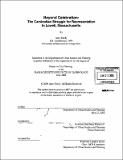Beyond cerebration : the Cambodian struggle for representation in Lowell, Massachusetts
Author(s)
Stitely, Amy (Amy Melissa)
DownloadFull printable version (31.22Mb)
Other Contributors
Massachusetts Institute of Technology. Dept. of Urban Studies and Planning.
Advisor
Sam Bass Warner, Jr.
Terms of use
Metadata
Show full item recordAbstract
Since the early 1980s, an estimated 30,000 Cambodians have found their way to Lowell, Massachusetts. Constituting nearly 25% of the total population, they are now the city's dominant minority group. This thesis began as a study of the Cambodian community in Lowell and their rise to civic participation thirty years since their first arriving. By researching the evolution of one refugee community in one post-industrial mill town, I sought to answer two questions: 1) How do new immigrants to America's smaller cities progress from being "outsiders" to engaged community members? and 2) What can be done to facilitate this movement? This thesis shows that the path from "outsider" to "insider" is not easily described. There are multiple ways for immigrants to enter the civic structure of a city, and the routes chosen by a particular ethnic group in a particular city depend on a number of factors including, but not limited to: 1) the ethnic group's cultural predisposition toward politics, education, work, and enterprise, 2) the speed at which city institutions reform to meet demographic change, 3) the level of financial and institutional support that is available for different types of organizing activities, 4) the presence of a vocal, educated class, and 5) the city's overall tolerance for "otherness."In conversations with Lowell's Cambodian community leaders, I found that broadly supported art and cultural programs have given Cambodians a way in to civic life. These programs not only help them preserve their heritage and culture, they also act as community development tools. In addition, the existence of such programs helps reinforce Lowell's image as a progressive, cosmopolitan, and multi-cultural "Immigrant City." (cont) However, Cambodians and other non-whites have thus far had little success garnering positions on the school board, city council, city agencies, and police force. Given such exclusions, this thesis assesses the authenticity of Lowell's reputation as a good "Immigrant City" and gives voice to Cambodian community advocates who live and work within this construct.
Description
Thesis (M.C.P.)--Massachusetts Institute of Technology, Dept. of Urban Studies and Planning, 2008. Includes bibliographical references (p. 148-152).
Date issued
2008Department
Massachusetts Institute of Technology. Department of Urban Studies and PlanningPublisher
Massachusetts Institute of Technology
Keywords
Urban Studies and Planning.